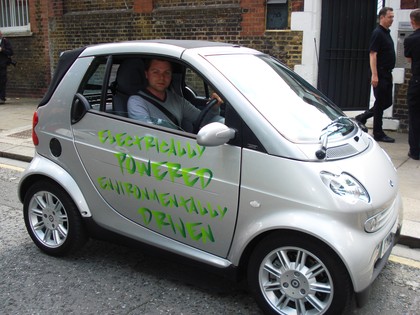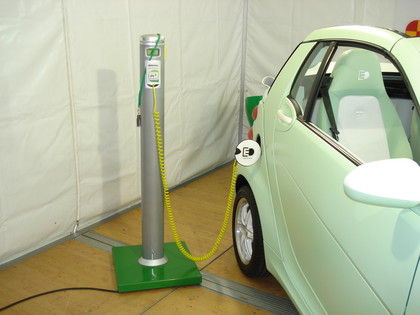Can new Smart car make the UK love electric?
We speak to the makers of the BRABUS electric drive
Query the lack of power in a Smart and they'll point to how much fun the car is to drive – this is all to do with the battery pack being in the floor, making a better centre of gravity.
Couple this with the fact that you can get the equivalent to 300Mph to the gallon and electric cars start to make a little bit of sense.

TechRadar managed to test drive the Smart ED (Electric Drive) which has been given a limited rollout of 100 for select members of the public to use (government officials, lecturers etc) and we were genuinely surprised by how well it ran.
Despite expecting it to be an experience akin to driving a milk-float, the drive was smooth and there was actual power when you put your foot down. Getting to 0-30 takes around 6.5 seconds, with a top speed of 60Mph.
The lack of engine noise did lead us to think we were constantly stalling but, hey, the BARBUS' 'fake racing car noise' will soon put a stop to that.
"The next batch of 100 eco cars aren't about testing the car," explained Moos when we asked about the next-gen of EDs (due at the end of 2009). "We want to test the customer."
When asked whether the biggest hurdle to get over for electric car manufacturing was the technology or the consumer, it was agreed that a lot needs to be done to sway consumer opinion away from petrol-based vehicles.
Sign up for breaking news, reviews, opinion, top tech deals, and more.
Mercedes-Benz has released a number of cars to ease the consumer into eco-aware car consumption. Straying from the ED is the Smart 'FourTwo cdi' – a diesel-based car that currently boasts the world's lowest CO2 emissions for an automobile.
But it's electric vehicles that are favoured for the future, with champions like London Mayor Boris Johnson, saying recently: "It is absolutely fantastic to see manufacturers like Smart leading the way to make the electric vehicle an easy choice for Londoners."

London could be one of the biggest trend-setters for the electric car, with a multitude of benefits set to come to owners. Enticements like the lack of Congestion Charge, free parking and the fact it costs around £1 to charge the battery could sway urbanites to go electric.
The heart of the electric car is indeed the battery. Recently Smart announced a link-up with Tesla to produce batteries for the Smart range. Tesla is a big name in the electric car world. Its CEO is ex-PayPal co-founder Elon Musk, so the company isn't exactly short of money, and its Tesla Roadster shows that even sports cars can benefit from electric technology.
Using lithium-ion technology, early prototypes has the batteries running to a range of 100Mph, but this all comes at a cost; something that will need to be reduced if mass-market appeal it to happen.
But when can we expect this mass rollout? "With the electric car, we are currently doing tests in London, Rome, Paris and the United States," explained Moos, "we are looking to going into full production by 2012."
It's quite an apt time for mass production of the electric car, considering the Olympics are set for that year.
To go from 100 electric Smart cars in the world to this sort of availability will take an Olympic-sized effort from Mercedes-Benz, but Moos is extremely confident that the Smart brand is the brand to guide the automobile in the UK to an eco world.
"What we are doing at Smart is important. As our CEO once said: if the Smart car wasn't invented 10 years ago, then it would have to be invented now."

Marc Chacksfield is the Editor In Chief, Shortlist.com at DC Thomson. He started out life as a movie writer for numerous (now defunct) magazines and soon found himself online - editing a gaggle of gadget sites, including TechRadar, Digital Camera World and Tom's Guide UK. At Shortlist you'll find him mostly writing about movies and tech, so no change there then.